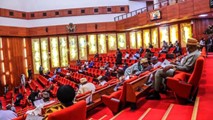The Senate has issued a stern warning to heads of Federal Government agencies found culpable of financial infractions as detailed in the Auditor-General for the Federation’s (AuGF) report. Parliamentary sanctions will be invoked against any agency heads who fail to comply with Senate resolutions or respond to its summons.
This decision was disclosed by Senator Garba Madoki, Chairman of the Senate Committee on Legislative Compliance, during a one-day roundtable workshop in Abuja. Madoki criticized the persistent disregard for Senate summons by some ministries, departments, and agencies (MDAs) and emphasized the chamber’s commitment to enforcing compliance.
Madoki reiterated the Senate’s intent to act on the Auditor-General’s report, stating, “We are going to be very strict on the report of the Auditor-General for the Federation. Measures will be taken against everybody who refused to comply with Senate resolutions on the matter.”
He warned that non-compliance would no longer be tolerated and that necessary sanctions would be applied to enforce accountability.
The Auditor-General’s report has highlighted irregularities amounting to N105.66 billion, with several expenditures violating existing financial regulations. Specifically, it revealed that N18.36 billion was spent on contracts awarded without adherence to the Public Procurement Act.
The AuGF expressed ongoing concerns over systemic weaknesses in the financial management of public funds. These issues persist despite repeated recommendations to key officials, including the Minister of Finance, Budget, and National Planning and the Accountant-General of the Federation.
The report emphasizes the urgency of accountability and transparency in managing Nigeria’s limited revenues, which are critical for the country’s economic stability and development goals.
The Senate Committee on Public Accounts is actively addressing the Auditor-General’s findings. Madoki assured stakeholders of the Senate’s determination to ensure accountability within public institutions, “We will take this job seriously. Where sanctions are required, we will not hesitate to sanction any MDA that violates the laws of this country, either inadvertently or wilfully.”
Senate President Godswill Akpabio, represented by his deputy, Jibrin Barau, underscored the importance of legislative compliance for effective governance. He emphasized legislative resolutions must be respected and implemented to uphold public trust and drive national development.
Akpabio stated, “Legislative compliance is critical to the success of governance. Without it, the effectiveness of the National Assembly is undermined, public trust in government is eroded, and the development agenda is stalled.” He reaffirmed that the National Assembly’s role extends beyond lawmaking to include ensuring laws are implemented and that non-compliance is addressed decisively.
The acting Clerk to the National Assembly, Mr. Kamoru Ogunlana, emphasized the importance of legislative compliance in fostering good governance and societal trust. According to Ogunlana, effective implementation of laws ensures sustainable development and social justice. He noted, “Legislative compliance is not merely a legal framework but the backbone of good governance. Through robust processes and compliance mechanisms, we can enhance citizen trust and confidence in our institutions.”
As the Senate takes a firm stance on financial infractions and legislative compliance, it aims to strengthen accountability and transparency in public institutions. The commitment to enforcing the Auditor-General’s findings sends a clear message to MDAs that disregard for regulations and public funds will not be tolerated. This development signals a renewed focus on good governance, with the Senate prioritizing the interests of Nigerians and ensuring that government resources are managed responsibly to achieve the nation’s development goals.




































